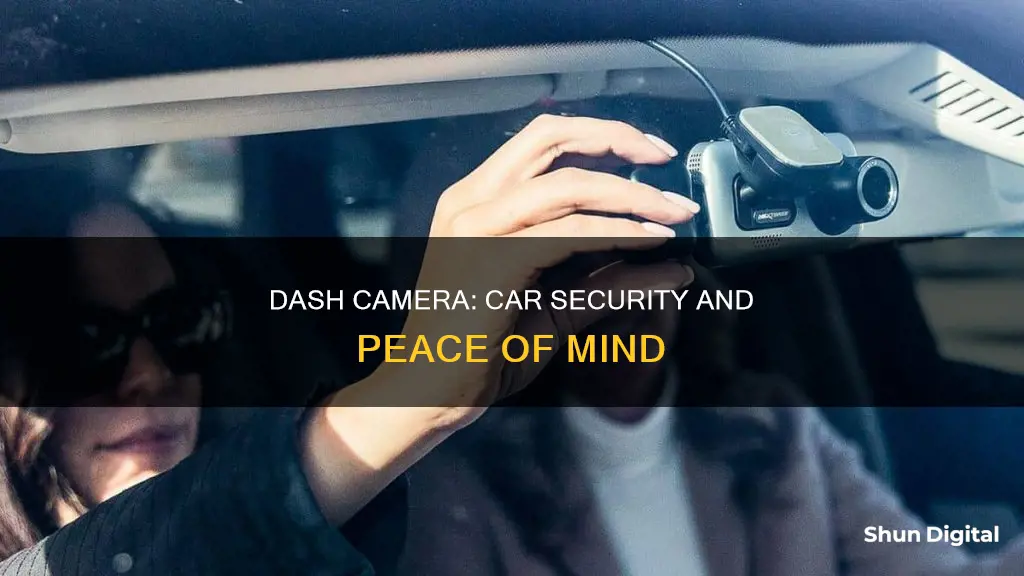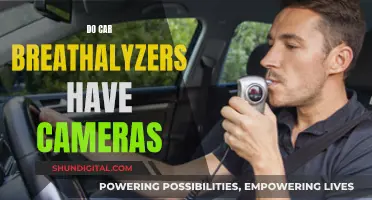
A dashboard camera, or dash cam, is a device that is mounted on the windscreen or dashboard of a car, continuously recording the view through the front windscreen and sometimes the rear or other windows. Dash cams are designed to act as a silent witness in the event of accidents, providing unbiased evidence that can be used to prove fault and protect drivers from insurance fraud. They can also be used to report undisciplined or drunk drivers, monitor new or reckless drivers, and prevent parking accidents. Additionally, dash cams with built-in GPS can help track the car's speed and location, while some models offer advanced driver assistance systems (ADAS) with features like lane departure warnings. While dash cams vary in price and features, they have become increasingly popular due to their ability to provide drivers with added security and peace of mind.
| Characteristics | Values |
|---|---|
| Evidence in case of an accident | Provides real-time, straight-to-the-point proof in case of an accident |
| Report undisciplined drivers | Helps report drunk, reckless, or bad drivers |
| Monitor new drivers | Monitors the driving habits of new drivers |
| Prevent fraud | Prevents insurance fraud |
| Record road trips | Records your entire road trip |
| Prevent parking accidents | Can be set to stay on throughout the night to prevent parking accidents |
| Capture unexpected events | Can capture unexpected events, such as accidents, paranormal activity, and animals |
| Record sounds | Records sounds and images while you are driving |
| Record inside the car | Some dash cams have a cabin camera that records the interior of the car |
| Affordable | Affordable and feature-rich |
What You'll Learn

Evidence in accidents
A car dash camera can be a very useful tool for proving liability and providing evidence in the event of a car accident. The camera acts as a "silent witness", recording every detail that takes place on the road. This can be invaluable when trying to establish fault in an accident, as it provides an unbiased record of what happened.
Dashcams can capture moments that would otherwise be difficult to prove, such as a car cutting you off, another vehicle refusing to yield, or a hit-and-run incident. They can also record important details such as the colour, make, model, and license plate of the vehicle involved in the accident. This information can be very valuable for insurance claims and police reports, which often rely on eyewitness testimony that may not always be accurate.
Additionally, dashcam footage can help to resolve disputes and strengthen insurance claims by providing clear evidence of what occurred. It can also protect against false insurance claims and auto insurance fraud, which is estimated to cost taxpayers upwards of $1.6 billion annually in North America. Dashcam footage can also be used to dispute unfair driving tickets that could otherwise increase insurance premiums.
In some cases, dashcam footage may not be conclusive evidence, as it may not always provide a clear picture of what happened. However, it can still be a valuable tool for establishing fault and providing additional context to support other evidence. It's important to note that dashcams do not discriminate and will record your own driving mistakes as well, which could potentially be used against you in insurance claims or legal proceedings.
Overall, a car dash camera can provide detailed evidence in the event of a car accident, helping to establish fault, resolve disputes, and strengthen insurance claims. While not always conclusive, it can provide valuable context and protect against false claims and fraud.
Leatherette Camera: What's It Really Made Of?
You may want to see also

Prevent fraud
A dash cam can be an effective tool to prevent fraud and protect yourself from scammers. In this day and age, insurance fraud is becoming increasingly common, costing insurers billions of dollars each year and resulting in higher premiums for everyone. Dash cams can help you document any potential cases of insurance fraud, making it easier to prove your case and get the compensation you deserve.
One of the most common insurance scams is staged accidents, where two or more drivers collude to create an accident and then file bogus claims. For example, in a "swoop and squat" scheme, one car positions itself in front of the victim's vehicle, and another car cuts off the first car, causing a harsh braking instance and resulting in the victim rear-ending one of the scammers. Dash cams can record the entire incident, providing valuable evidence to help determine the at-fault party and protect yourself from false accusations.
Additionally, dash cams can also be used to monitor the driving behaviour of employees or new teen drivers. Fleet managers can use dash cams to learn more about and correct driver behaviours, as well as provide objective insights in the event of a collision. This can be especially useful in the case of heavy-duty trucks, which often require extra space in front and behind them to perform safe braking maneuvers. Dash cams can help defend against accusations of fault in these types of accidents, which are common within the fleet industry.
In most jurisdictions, dash cam footage is admissible in court and can be used as evidence to support your case. By having a clear and unbiased record of the events, you can avoid being taken advantage of by fraudulent claims and lowball settlement offers from insurance companies. Dash cams can also help provide evidence in the event of a hit-and-run or other crimes, giving you peace of mind and protection on the road.
Dash Cameras: Legal in Florida?
You may want to see also

Monitor new drivers
Dash cams are a great way to monitor new drivers in your vehicle. They can help you keep an eye on their driving habits and behaviours, and address any aggressive driving habits early on. Here are some benefits of using a dash cam for this purpose:
Protection and Security
Having a dash cam in your car provides safety, security, and peace of mind, especially when it comes to new drivers. In the event of an accident, a dash cam can provide an objective recording of what happened, helping to resolve questions about who was at fault. This can be invaluable in protecting yourself and your new driver from false accusations or insurance fraud.
Incident Detection and Recording
Many dash cams have incident detection features that use visual and gravitational force clues to detect a possible accident. They will automatically save the recording before it can be overwritten, ensuring you have vital footage of the incident. This can be crucial in determining what happened and assigning fault, especially if the new driver is unsure or unable to provide details.
Dual-Camera Systems
If you want to monitor a new driver's behaviour inside the vehicle as well as their driving, consider a dual-camera dash cam. These systems record video from two cameras simultaneously, one directed forward through the windshield and the other recording the passenger compartment. This can be particularly useful for identifying distracted driving behaviours, such as phone use or passenger interactions, that may contribute to accidents.
GPS Tracking
Dash cams with built-in GPS can provide additional data such as travel speed, location, and sudden starts or stops. This information can be helpful in reconstructing the new driver's trip and identifying any areas where they may need improvement. It also allows you to monitor the whereabouts of your vehicle in real time, giving you insight into the new driver's routes and habits.
Night Vision
If your new driver is frequently on the road after dark, consider a dash cam with night vision capability. This feature improves recording clarity in low-light conditions, ensuring that you can still see important details like licence plates and road signs. It can also help capture the new driver's behaviour and surroundings in darker conditions, such as night-time driving or dimly lit parking lots.
Panasonic Cameras with Focus Stacking: Top Models to Consider
You may want to see also

Record road trips
Recording your road trip with a dash cam is a great way to capture your journey and relive your favourite moments. Here are some tips to help you record your road trip like a pro:
Plan Your Route
Before you set off, take some time to plan your route. This will allow you to scout out the most scenic locations and make sure you don't miss any must-see landmarks or points of interest. By planning your route in advance, you can also make sure you are driving during optimal lighting conditions to get the best footage.
Check Local Laws
It's important to familiarise yourself with the local laws regarding dash cams and where you can mount them. Some states have tight restrictions on mounting items to your windshield, as they can obstruct the driver's view. While dash cams are generally legal, make sure you place them in a spot that won't break any laws.
Mount Your Dash Cam Properly
When mounting your dash cam, choose a spot that won't obstruct your view of the road. The ideal position is usually high and centred on the windshield, near the rearview mirror. This will give you a clear view of the road ahead without blocking your field of vision.
Use a High-Quality Dash Cam
Invest in a dash cam that offers high-resolution recording, such as 1080p full HD or 4K. This will ensure that your footage is clear and detailed, allowing you to capture the beauty of your surroundings. A wide-angle lens can also help you capture more of the scenery, especially if you're driving through winding mountain roads or scenic highways.
Utilise Additional Features
Many dash cams come with additional features that can enhance your road trip recording. For example, GPS tracking can help you keep track of your route and the locations of your videos. An LCD screen can make it easier to adjust camera settings on the go. Voice control can be useful if you're driving alone, allowing you to operate the dash cam with your voice while keeping your hands on the wheel.
Manage Storage
Make sure you have enough storage space on your dash cam or an SD card to store all your footage. If your dash cam has loop recording, delete any old or unnecessary videos to free up space. Alternatively, bring a laptop or external hard drive so you can back up your videos and continue recording.
Power Considerations
Keep in mind that dash cams typically draw power from the vehicle's battery. If you plan on using the dash cam while the car is turned off, consider investing in a hardwire kit or a portable power bank. This will ensure that your dash cam has a continuous power supply without draining your car's battery.
Edit and Share Your Footage
Once you've captured your road trip footage, take some time to edit and share your videos. You can use video editing software to trim clips, add music, and create a memorable video to share with your friends and family.
By following these tips, you'll be well on your way to recording your road trip like a pro and creating lasting memories of your journey.
Blackmagic Pocket Cinema Camera: Powering Your Creative Vision
You may want to see also

Protect parked cars
Motor vehicle thefts have been steadily rising in the United States over the past decade, and about 80% of vehicle-related thefts happen at night. A car dash camera can help protect your parked car in several ways.
Firstly, a dash cam with smart parking mode can vigilantly watch over your vehicle while you're away. Unlike regular dash cams, which record continuously, a smart parking mode dash cam will only record when an incident occurs, such as when impact or motion is detected. This means you won't have to sort through hours of useless footage later. The footage of the incident is then locked and protected for later review. Some dash cams will even provide real-time notifications if something happens to your vehicle, allowing you to take immediate action.
Additionally, dash cams with parking mode are equipped with high-quality image and vibration sensors that can detect motion or impact. This ensures that if your vehicle is tampered with, bumped, or broken into, you'll have clear video evidence of what happened. Some dash cams even offer pre-buffering, capturing 5-10 seconds of footage before an impact, which can be crucial for capturing hit-and-run license plates or the faces of vandals.
Another benefit of a dash cam is the peace of mind it provides. With a dash cam, you don't have to worry about what might happen to your vehicle when it's parked. Whether it's parked on the street, at the mechanic, or in a parking lot, you can rest assured that your vehicle is being monitored 24/7.
To ensure reliable 24/7 parking surveillance, some dash cams also have motion detection features. This means that the dash cam will only record when a human or vehicle is detected, helping to save power and storage space.
When choosing a dash cam to protect your parked car, consider one with advanced features like impact detection, motion detection, and real-time notifications. While some basic dash cams may not have parking mode, investing in a quality dash cam with this feature can provide added security for your vehicle.
Keep Camera Batteries Warm for Winter Photography
You may want to see also







